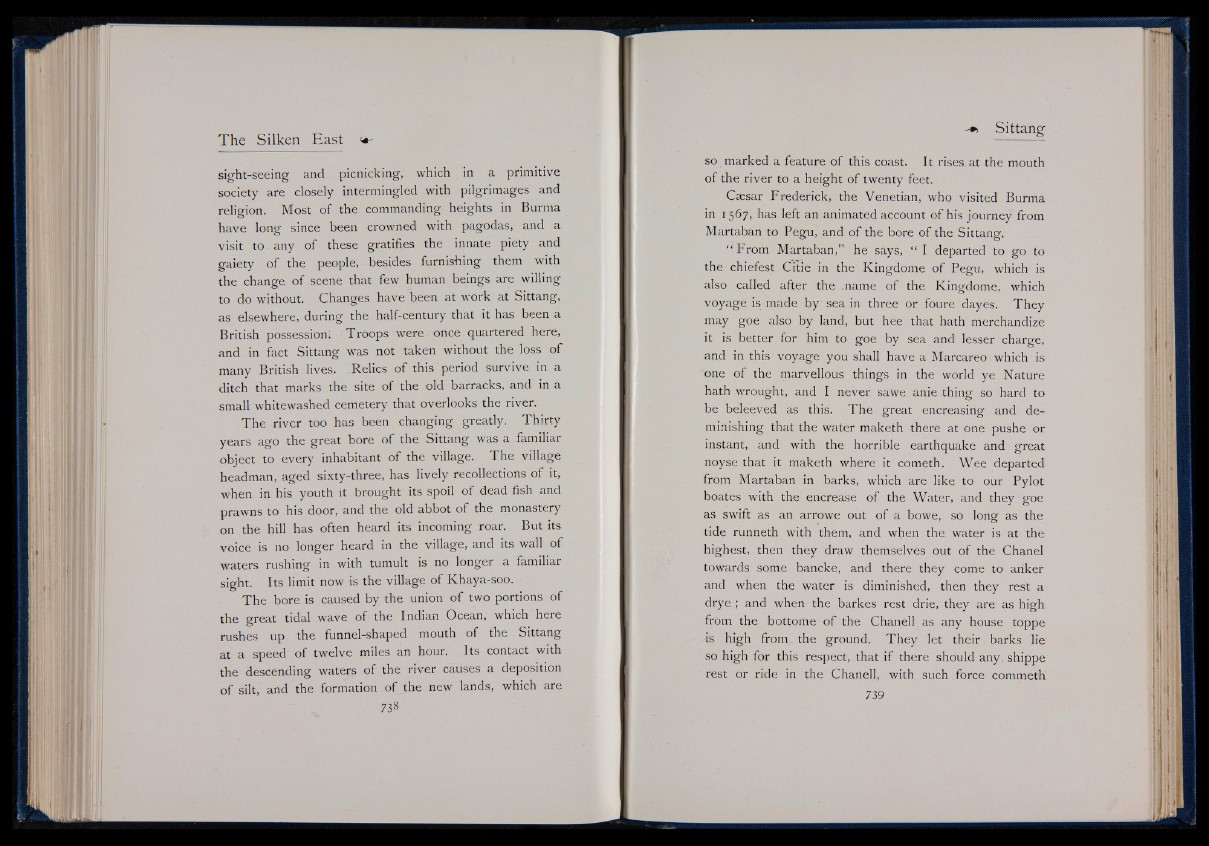
sight-seeing and picnicking, which in a primitive
society are closely intermingled with pilgrimages and
religion. Most of the commanding heights in Burma
have long since been crowned with pagodas, and a
visit to any of these gratifies the innate piety and
gaiety of the people, besides furnishing them with
the change of scene that few human beings are willing
to do without. Changes have been at work at Sittang,
as elsewhere, during the half-century that it has been a
British possession. Troops were once quartered here,
and in fact Sittang was not taken without the loss of
many British lives. Relics of this period survive in a
ditch that marks the site of the old barracks, and in a
small whitewashed cemetery that overlooks the river.
The river too has been changing greatly. Thirty
years ago the great bore of the Sittang was a familiar
object to every inhabitant of the village. The village
headman, aged sixty-three, has lively recollections of it,
when in his youth it brought its spoil of dead fish and
prawns to his door, and the old abbot of the monastery
on the hill has often heard its incoming roar. But its
voice is no longer heard in the village, and its wall of
waters rushing in with tumult is no longer a familiar
sight. Its limit now is the village of Khaya-soo.
The bore is caused by the union of two portions of
the great tidal wave of the Indian Ocean, which here
rushes up the funnel-shaped mouth of the Sittang
at a speed of twelve miles an hour. Its contact with
the descending waters of the river causes a deposition
of silt, and the formation of the new lands, which are
738
so marked a feature of this coast. It rises, at the mouth
of the river to a height of twenty feet.
Caesar Frederick, the Venetian, who visited Burma
in 1567, has left an animated account of his journey from
Martaban to Pegu, and of the bore of the Sittang.
“ From Martaban,” he says, “ I departed to go to
the chiefest Citie in the Kingdome of Pegu, which is
also called after the .name of the Kingdome, which
voyage is made by sea in three or foure dayes. They
may goe also by land, but hee that hath merchandize
it is better for him to goe by sea and lesser charge,
and in this voyage you shall have a Marcareo which is
one of the marvellous things in the world ye Nature
hath wrought, and I never sawe anie thing so hard to
be beleeved as this. The great encreasing and de-
minishing that the water maketh there at one pushe or
instant, and with the horrible earthquake and great
noyse that it maketh where it cometh. Wee departed
from Martaban in barks, which are like to our Pylot
boates with the encrease of the Water, and they goe
as swift as an arrowe out of a bowe, so long as the
tide runneth with them, and when the water is at the
highest, then they draw themselves out of the Chanel
towards some bancke, and there they come to ariker
and when the water is diminished, then they rest a
drye ; and when the barkes rest drie, they are as high
from the bottome of the Chanell as any house toppe
is high from the ground. They let their barks lie
so high for this respect, that if there should any, shippe
rest or ride in the Chanell, with such force commeth
739